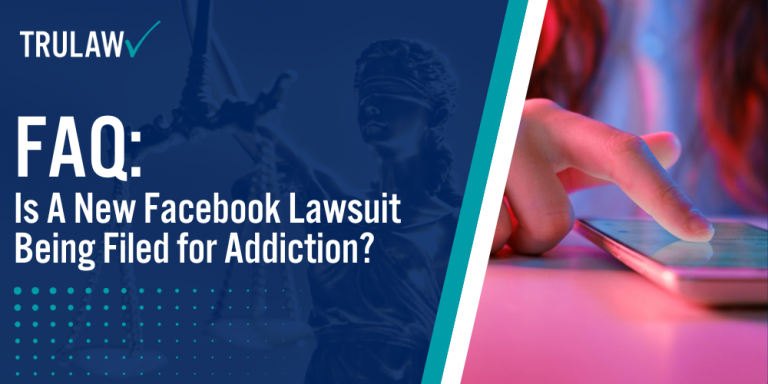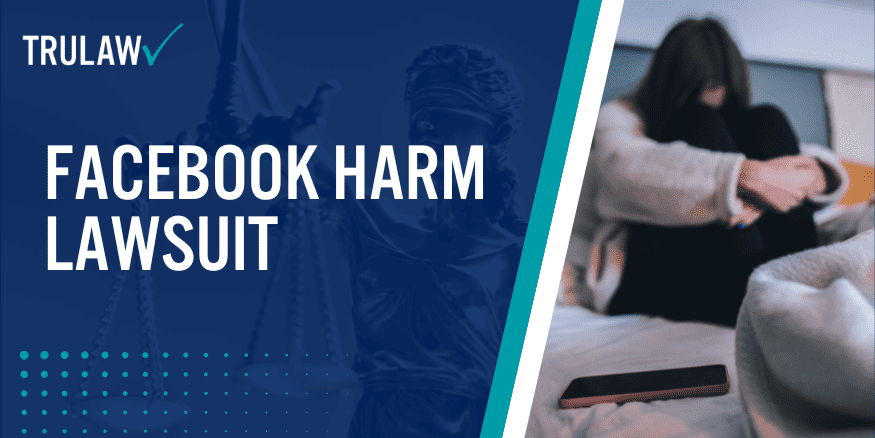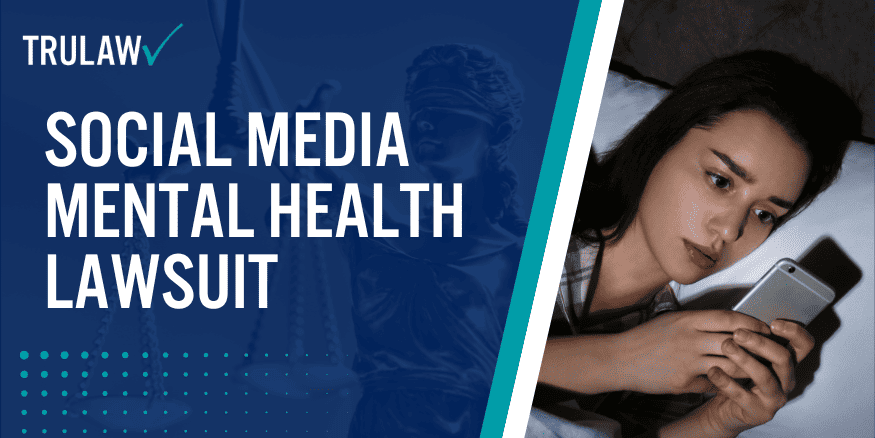Social Media Harm Eating Disorders: Social Media Liability
- Last Updated: July 9th, 2024

Attorney Jessie Paluch, founder of TruLaw, has over 25 years of experience as a personal injury and mass tort attorney, and previously worked as an international tax attorney at Deloitte. Jessie collaborates with attorneys nationwide — enabling her to share reliable, up-to-date legal information with our readers.
Legally Reviewed
This article has been written and reviewed for legal accuracy and clarity by the team of writers and legal experts at TruLaw and is as accurate as possible. This content should not be taken as legal advice from an attorney. If you would like to learn more about our owner and experienced injury lawyer, Jessie Paluch, you can do so here.
Fact-Checked
TruLaw does everything possible to make sure the information in this article is up to date and accurate. If you need specific legal advice about your case, contact us by using the chat on the bottom of this page. This article should not be taken as advice from an attorney.
Key takeaways:
- Social media platforms can contribute to distorted body image and low self-esteem, particularly among young users, by promoting unrealistic beauty standards and encouraging detrimental social comparisons.
- Excessive social media use has been linked to negative mental health outcomes, including body dissatisfaction, depression, and eating disorders, prompting a call for action from the U.S. Surgeon General.
- The COVID-19 pandemic has exacerbated the impact of social media on eating disorders, with isolation, food scarcity, and exposure to toxic body images.
Overview of Social Media Harm Eating Disorders
On this page, we’ll discuss Social Media harm eating disorders, the link between social media harm and eating disorders, legal grounds for filing a social media harm lawsuit for an eating disorder, and much more.
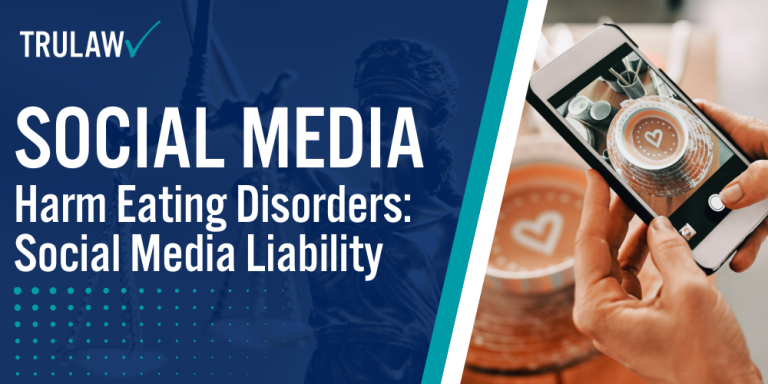
Intro to Social Media Harm Eating Disorders
Some key aspects of Social Media Harm Eating Disorders include:
- Promotion of Unrealistic Body Standards: Claims that social media platforms promote unrealistic beauty standards, contributing to the development of eating disorders.
- Inadequate Content Moderation: There are allegations that social media companies fail to effectively moderate content related to eating disorders, allowing harmful material to spread.
- Targeting Vulnerable Users: Accusations that social media algorithms target users who are more susceptible to developing eating disorders.
- Lack of Resources and Support: Claims that social media platforms do not provide adequate resources or support for users struggling with eating disorders.
If you or someone you love has developed an eating disorder due to social media use, you may be eligible to pursue compensation.
Contact Tru Law using the chat on this page for an instant case evaluation to determine if you qualify to join others filing Social Media Harm Eating Disorder Lawsuits.
Table of Contents
Overview of the Social Media Harm Eating Disorders
On this page, we’ll discuss an overview of social media harm, mental health risks, the U.S. Surgeon General’s warning on social media and mental health, and much more.
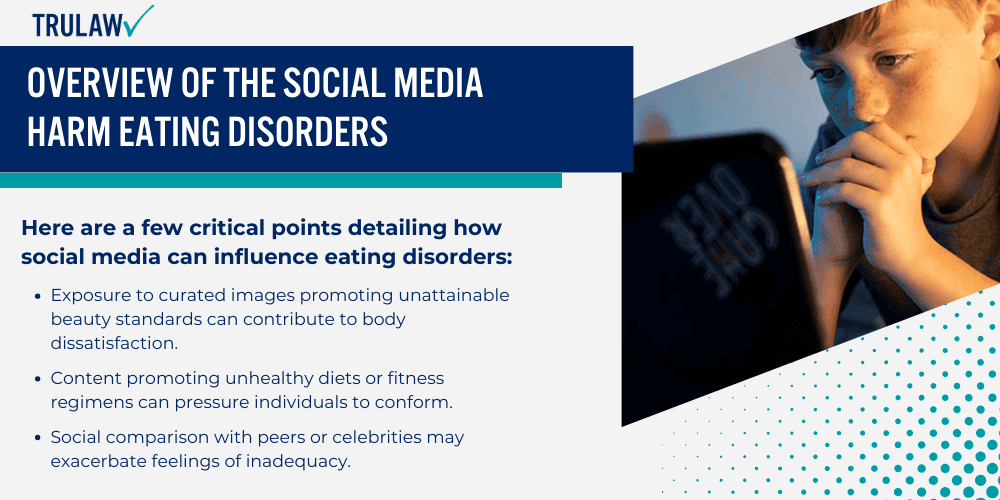
Intro to Social Media’s Impact on Eating Disorders
The pervasive influence of social media on the lives of social media users has ignited significant concern regarding mental health, particularly in the context of eating disorders.
Here are a few critical points detailing how social media can influence eating disorders:
- Exposure to curated images promoting unattainable beauty standards can contribute to body dissatisfaction.
- Content promoting unhealthy diets or fitness regimens can pressure individuals to conform.
- Social comparison with peers or celebrities may exacerbate feelings of inadequacy.
- Certain online communities may inadvertently encourage disordered eating behaviors.
Toxic Effects of Social Media on Body Image and Self-Esteem
Social media platforms have become integral to real life, particularly for young people.
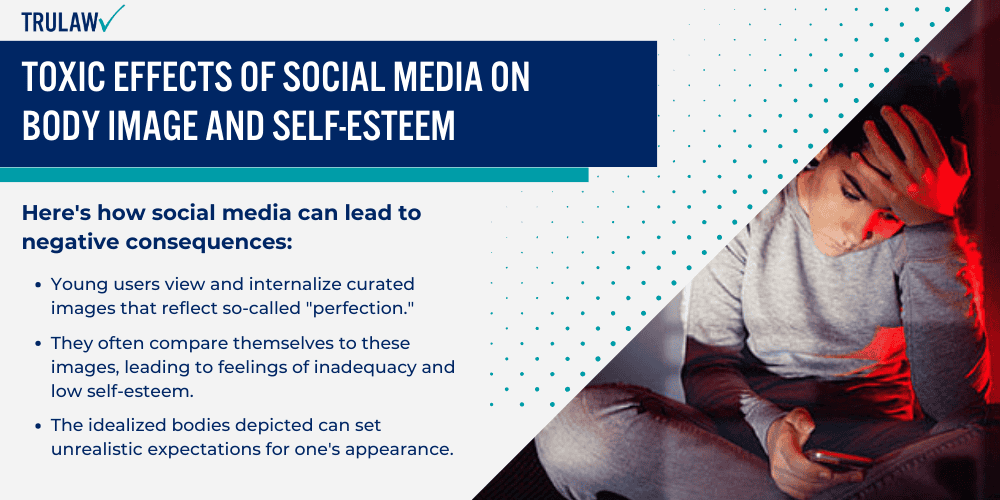
These platforms, while connecting users, also contribute to the distortion of body image and the erosion of self-esteem.
Social Comparisons and Unrealistic Expectations from Social Media
Social media presents a stream of images and messages that often promote unattainable beauty standards.
This constant exposure can lead individuals, especially young people, to make detrimental social comparisons.
Here’s how social media can lead to negative consequences:
- Young users view and internalize curated images that reflect so-called “perfection.”
- They often compare themselves to these images, leading to feelings of inadequacy and low self-esteem.
- The idealized bodies depicted can set unrealistic expectations for one’s appearance.
- This can result in persistent dissatisfaction with one’s body image.
Negative Mental Health Effects of Social Media on Body Image
The influence of social media extends to mental health issues, with several studies indicating a direct relationship between social media use and negative mental health outcomes.
Social media use can lead to a variety of negative consequences for body image, including:
- Body image concerns have been linked to extensive social media use, fostering a propensity towards low self-esteem.
- Research has shown that the more time spent on social media, the greater the dissatisfaction with one’s body and appearance.
- For some users, particularly adolescents and young adults, this dissatisfaction can evolve into mental health issues such as depression or social anxiety.
- It is important to recognize the connection between social media addiction and its impact on psychological well-being.
U.S. Surgeon General’s Warning on Social Media and Mental Health
The Surgeon General’s advisory has highlighted the mental health risks associated with social media use, marking it as a significant public health concern.
The advisory points out the problems and calls for action to mitigate harm and support well-being.
Here are key takeaways from the U.S. Surgeon General’s stance on social media and mental health:
- The advisory acknowledges the potential for social media to engender serious mental health challenges.
- It demands action from various sectors, including technology companies and policymakers.
- The advisory calls for more research to understand and address the nuanced impact of social media.
- Encourages the development and promotion of healthier social media practices.
Social Media as a Risk Factor for Developing Eating Disorders
The correlation between a child’s social media use and eating disorders is becoming increasingly evident, particularly among adolescent girls.
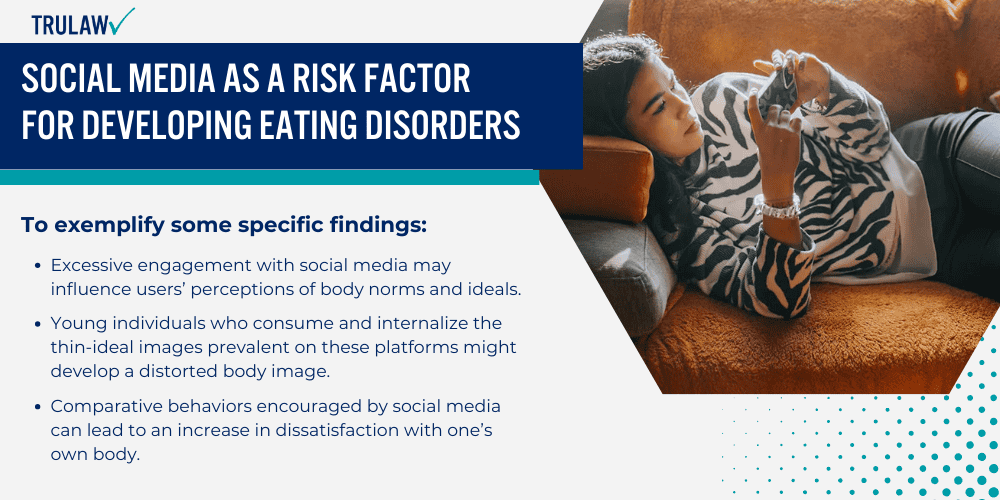
Evidence points to social media platforms that can amplify disordered eating behaviors and distort body image perceptions.
Review Linking Social Media Use to Eating Disorders and Body Image Issues
Social media’s influence on body image and eating patterns is a growing concern.
Research findings suggest a notable link between the extent of social media use and the rise in eating disorders, indicating that prolonged exposure to such platforms can exacerbate body dissatisfaction and disordered eating, especially among younger populations.
For instance, a scoping review highlighted the potential global public health issue stemming from the association between social media, body image, and eating disorders among young people.
To exemplify some specific findings:
- Excessive engagement with social media may influence users’ perceptions of body norms and ideals.
- Young individuals who consume and internalize the thin-ideal images prevalent on these platforms might develop a distorted body image.
- Comparative behaviors encouraged by social media can lead to an increase in dissatisfaction with one’s own body.
- There is a significant gender difference in how social media impacts body image, with females often being more affected.
Dove Self-Esteem Project Findings on Toxic Beauty Content Impact
The impact of social media’s toxic beauty standards on young users has been a focal point for initiatives like the Dove Self-Esteem Project.
This project emphasized how harmful beauty content can alter self-perception and affect unhealthy eating patterns.
Here are key takeaways from their findings:
- Selective exposure to toxic beauty content correlates with an increased risk of developing low self-esteem and eating disorders.
- Curating social media feeds to minimize negative content could reduce the adverse effects on body image and eating habits.
- There is a notable difference in how beauty standards affect adolescent girls compared to boys.
- Educational programs and interventions could play a role in mitigating the negative impacts of online social networking on eating behaviors.
Increase in Eating Disorder Hospitalizations During the Pandemic
The COVID-19 pandemic has caused a significant upsurge in hospital admissions for individuals struggling with eating disorders.
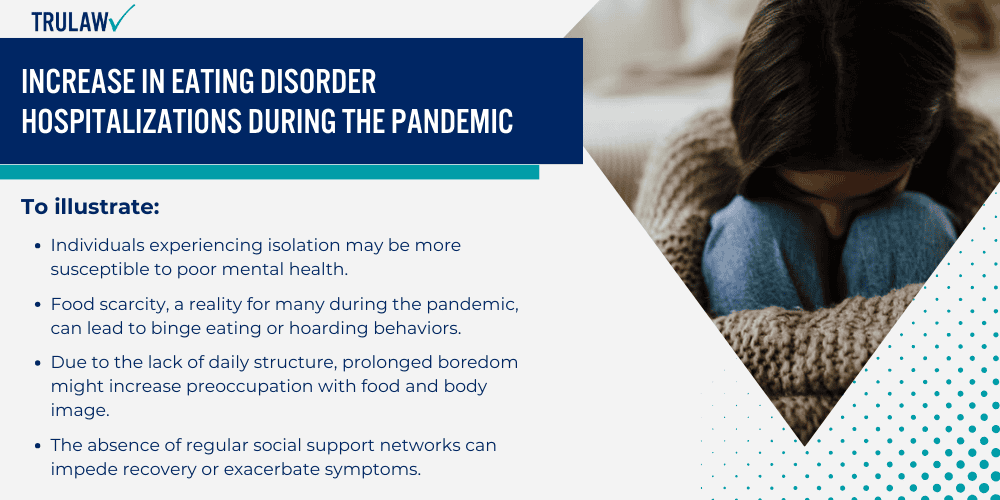
This rise is especially pronounced among the youth, with the added stress of the pandemic exacerbating underlying mental health issues.
Isolation, Food Scarcity, and Boredom Contributing to Eating Disorders
Isolation, often enforced during pandemic lockdowns, heightens feelings of loneliness and can trigger or worsen eating disorders.
To illustrate:
- Individuals experiencing isolation may be more susceptible to poor mental health.
- Food scarcity, a reality for many during the pandemic, can lead to binge eating or hoarding behaviors.
- Due to the lack of daily structure, prolonged boredom might increase preoccupation with food and body image.
- The absence of regular social support networks can impede recovery or exacerbate symptoms.
Exposure to Toxic Body Image Content on Social Media During Pandemic
Social media can be a double-edged sword; during the pandemic, it’s been linked to a toxic spread of body image content.
Here’s how:
- There’s been a rise in negative body image posts that promote unrealistic standards.
- Youth mental health is particularly vulnerable to such toxic content as adolescents are more likely to compare themselves to others on social media.
- Eating disorder-related content can often go unchecked on platforms, leading to greater exposure to social media harmful messages.
- Mental health problems can be amplified by social media’s echo chamber effect, where negative thoughts and attitudes reinforce themselves.
The pandemic has undeniably played a pivotal role in increasing hospital admissions for those with eating disorders, and these two factors—isolation and toxic social media content—are key contributors to this troubling trend.
Normalization of Unhealthy Beauty Standards on Social Media
Social media platforms facilitate a unique environment that reshapes perceptions of beauty and body image, often promoting ideals that may negatively impact mental and emotional health, particularly among adolescents.
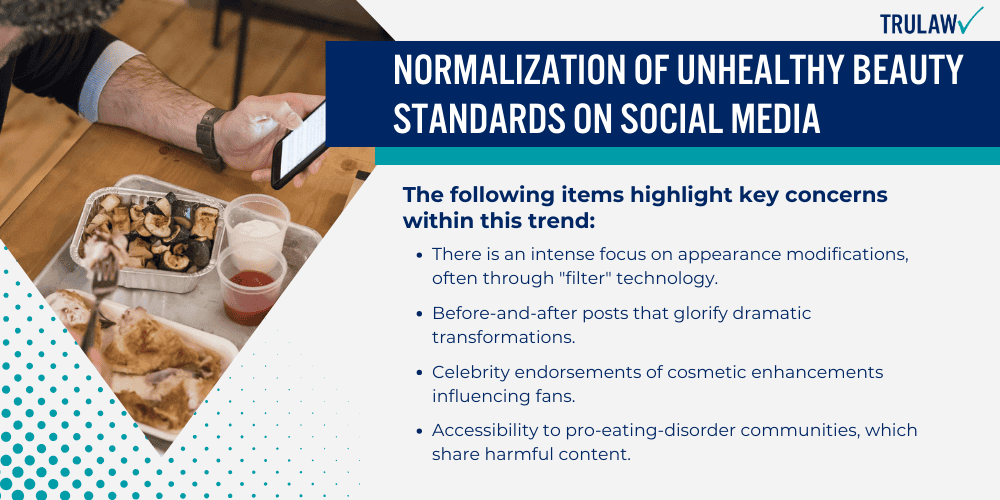
Promotion of Cosmetic Procedures and Pro-Eating-Disorder Content Online
Social media has become a prominent space for the advertising and normalization of cosmetic procedures.
They frequently display a distorted reality where such interventions are commonplace and casually encouraged.
This portrayal can adversely affect young people’s mental health as they may feel pressured to meet these manufactured standards.
The following items highlight key concerns within this trend:
- There is an intense focus on appearance modifications, often through “filter” technology.
- Before-and-after posts that glorify dramatic transformations.
- Celebrity endorsements of cosmetic enhancements influencing fans.
- Accessibility to pro-eating-disorder communities, which share harmful content.
“Thinspo” and “Fitspo” Trends Perpetuating Perfect Body Ideals
The terms “thinspiration” (thinspo) and “fitspiration” (fitspo) refer to content on social media apps that glorifies thinness and fitness as the ultimate goals.
Here’s how these trends can propagate unhealthy beauty standards:
- Images and videos depicting extremely thin or muscular bodies are the norm.
- Hashtags that encourage the pursuit of an “ideal” physical form.
- Community engagement in sharing tips and reinforcement of these ideals.
- Growth in diet and exercise ‘challenges’ that may not align with adolescent health guidelines.
Both “thinspo” and “fitspo” can foster a negative body image, making users feel inadequate by constantly comparing them to these idealized physiques.
This effect can be particularly pronounced in highly visual platforms such as Instagram and TikTok, where visual content is the primary method of communication.
Pseudoscientific Claims and "Wellness" Posts Leading to Disordered Eating
In a digital age where access to social media is ubiquitous, a concerning trend has emerged: pseudoscientific wellness claims contributing to disordered eating and poor sleep quality.
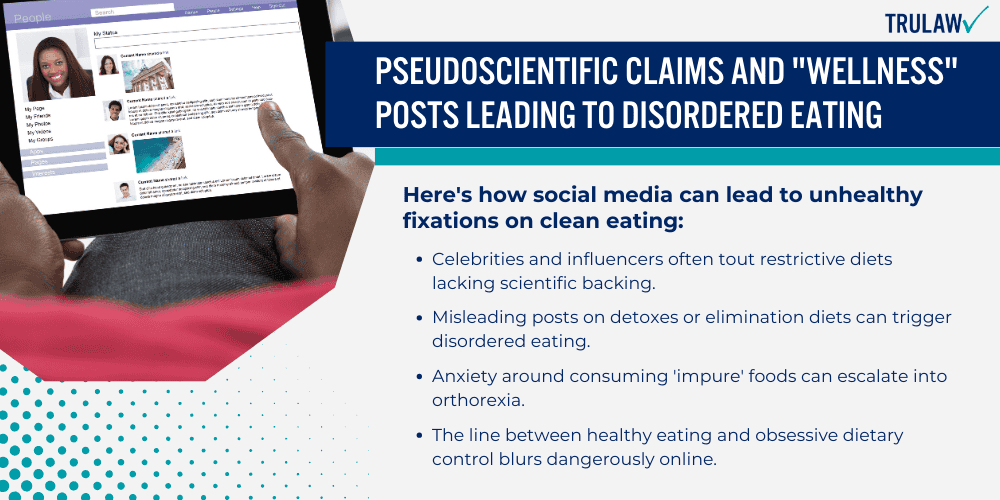
Without proper scrutiny of these online assertions, teen social media users are at risk of adopting harmful eating habits that masquerade as healthy lifestyles.
Obsessive Clean Eating Behavior Encouraged by Social Media Content
Social media platforms are rife with content promoting ‘clean eating’ as the epitome of health.
However, when taken to extremes, such diets can foster obsessive behaviors and lead to a mental health condition defined by anxiety around food choices.
Here’s how social media can lead to unhealthy fixations on clean eating:
- Celebrities and influencers often tout restrictive diets lacking scientific backing.
- Misleading posts on detoxes or elimination diets can trigger disordered eating.
- Anxiety around consuming ‘impure’ foods can escalate into orthorexia.
- The line between healthy eating and obsessive dietary control blurs dangerously online.
Weight Cycling and Yo-Yo Dieting Resulting from Unfounded Diet Advice
The allure of rapid weight loss can seduce one into following unsound dietary advice circulating on social media.
This advice often leads to weight cycling, an unhealthy pattern with physical and psychological consequences.
Here’s how following unverified weight loss strategies on social media can lead to weight cycling:
- Yo-yo dieting is frequently the result of following unverified weight loss strategies.
- Metabolic rates can be negatively affected by constant diet fluctuations.
- Emotional distress and a sense of failure often accompany weight regain.
- A sustainable approach to weight management, often overshadowed by quick fixes, is seldom discussed.
By recognizing social media content’s impact on disordered eating, individuals can better evaluate the wellness information they encounter and prioritize their health over pursuing an often unattainable ideal.
Proposed Regulations and Policy Changes for Social Media Sites
With an eye on public health, this section examines specific legislative suggestions aimed at mitigating the risks social media pose especially regarding their potential influence on mental health issues, like eating disorders.
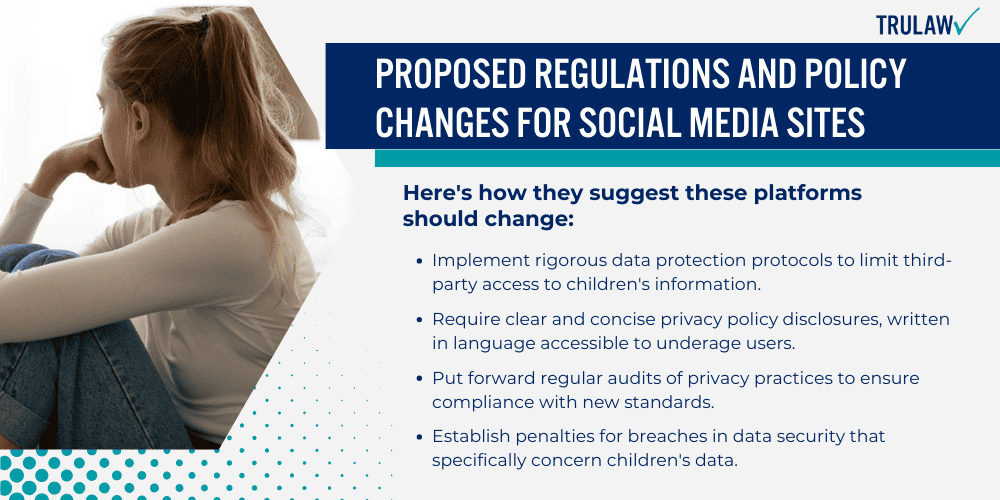
Increased Transparency and Higher Privacy Standards for Children’s Data
Legislators and advocates stress the importance of heightened privacy measures to protect children on social media platforms.
Here’s how they suggest these platforms should change:
- Implement rigorous data protection protocols to limit third-party access to children’s information.
- Require clear and concise privacy policy disclosures, written in language accessible to underage users.
- Put forward regular audits of privacy practices to ensure compliance with new standards.
- Establish penalties for breaches in data security that specifically concern children’s data.
Tax Incentives Discouraging Use of Altered Photos by Companies
This proposal outlines a two-pronged approach to promote realistic beauty standards and combat the negative effects of heavily edited photos: incentivize transparency and penalize deception.
To counteract the negative impacts of unrealistic body images amplified by social media, the following actions are proposed:
- Offer tax benefits to companies that pledge transparency by labeling photos that have been digitally altered.
- Impose fines on entities that promote altered images without clear disclosures, which may contribute to unhealthy body standards.
- Create a public rating system to access social media platforms, encouraging healthy content practices.
- Support campaigns educate users on the distorted realities often depicted on social media.
Strategies for Reducing Social Media Harm on Eating Disorders at Home
Engaging with social media responsibly at home is essential to mitigate its negative impact on eating disorders.
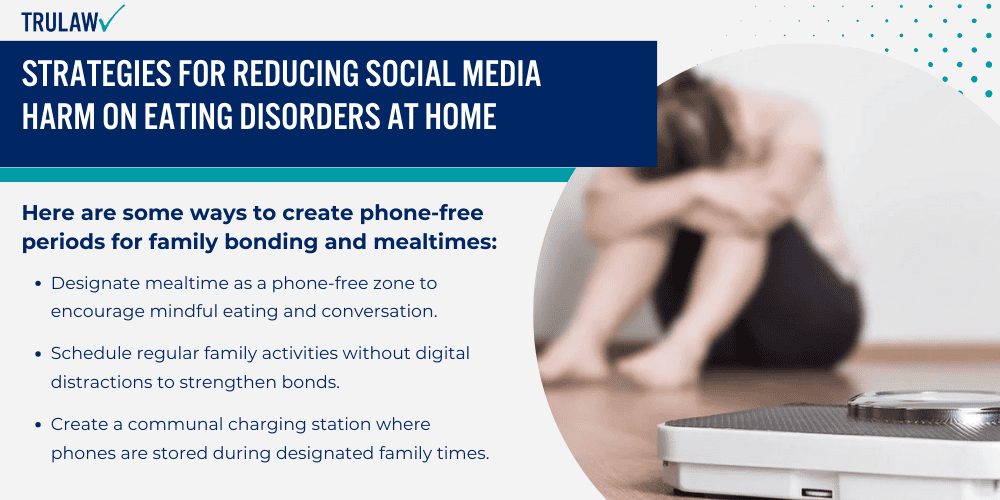
Families can counter the risks associated with excessive social media use by fostering an environment that promotes real interactions and sets positive examples.
Creating Phone-Free Periods for Family Bonding and Mealtimes
Implementing phone-free times at home can foster healthier relationships and eating habits.
Here are some ways to create phone-free periods for family bonding and mealtimes:
- Designate mealtime as a phone-free zone to encourage mindful eating and conversation.
- Schedule regular family activities without digital distractions to strengthen bonds.
- Create a communal charging station where phones are stored during designated family times.
- Encourage discussions about the day’s events instead of retreating to screens.
A focus on positive social habits is established by prioritizing face-to-face interactions during meals and family bonding time.
Modeling Healthy Social Media Behaviors and Encouraging Valued Activities
Parents and guardians must set a good example with their social media habits to teach their kids effectively.
Here are some ways parents and guardians can model healthy social media behaviors and encourage valued activities:
- Share insights on social media use and how it aligns with personal values.
- Demonstrate moderation by limiting your own screen time and encouraging other interests.
- Involve children in offline hobbies to illustrate the joy of varied experiences.
- Promote open conversations about the content they encounter online to teach critical thinking.
Through leading by example and nurturing various interests, families can cultivate a balanced approach to social media that leaves less room for harmful effects.
Frequently Asked Questions
-
To what extent can media representation of body image contribute to eating disorders?
Media representation of body image can significantly affect individuals’ perceptions of self and contribute to the development of eating disorders.
Studies have shown a correlation between exposure to idealized body images and increased body dissatisfaction, which can lead to disordered eating behaviors.
-
Are there specific types of social media content that are linked to increased eating disorder behavior?
Yes, certain types of social media content have been linked with increased eating disorder behavior.
Content promoting thin-ideal standards, dieting, and fitness regimens can intensify concerns about weight and appearance, potentially triggering eating disorder symptoms in vulnerable populations.
-
How does the portrayal of 'ideal' body types on social media influence young people's self-esteem and eating patterns?
The portrayal of ‘ideal’ body types can have a profound influence on young people by undermining their self-esteem and promoting unhealthy eating patterns.
The desire to emulate these unrealistic standards often exacerbates body dissatisfaction and can lead to restrictive dieting or compulsive eating.
-
Can social media usage facilitate the recovery process for individuals with eating disorders?
Social media usage can both hinder and facilitate the recovery process for individuals with eating disorders.
While Meta and other social media platforms can perpetuate negative behaviors, some supportive communities and resources can offer encouragement and positive reinforcement during recovery.
-
How do 'influencer' cultures on social platforms like Instagram play a role in shaping body image perceptions and potential disordered eating?
‘Influencer’ cultures on platforms like Instagram can significantly shape body image perceptions by frequently projecting a lifestyle centered around specific beauty and fitness goals.
Such a culture can encourage followers to compare themselves unfavorably to these often unattainable standards, possibly leading to disordered eating.
-
Is there evidence that reducing social media consumption leads to an improvement in eating disorder symptoms?
There is evidence to suggest that reducing social media consumption can lead to an improvement in eating disorder symptoms.
Limiting exposure to harmful content and shifting focus away from appearance-driven platforms can help decrease the preoccupation with body image and weight, enabling a more balanced and healthier perspective.

Experienced Attorney & Legal SaaS CEO
With over 25 years of legal experience, Jessie is an Illinois lawyer, a CPA, and a mother of three. She spent the first decade of her career working as an international tax attorney at Deloitte.
In 2009, Jessie co-founded her own law firm with her husband – which has scaled to over 30 employees since its conception.
In 2016, Jessie founded TruLaw, which allows her to collaborate with attorneys and legal experts across the United States on a daily basis. This hypervaluable network of experts is what enables her to share reliable legal information with her readers!
You can learn more about the Social Media Harm Lawsuits by visiting any of our pages listed below:
Here, at TruLaw, we’re committed to helping victims get the justice they deserve.
Alongside our partner law firms, we have successfully collected over $3 Billion in verdicts and settlements on behalf of injured individuals.
Would you like our help?
At TruLaw, we fiercely combat corporations that endanger individuals’ well-being. If you’ve suffered injuries and believe these well-funded entities should be held accountable, we’re here for you.
With TruLaw, you gain access to successful and seasoned lawyers who maximize your chances of success. Our lawyers invest in you—they do not receive a dime until your lawsuit reaches a successful resolution!
Do you believe you’re entitled to compensation?
Use our Instant Case Evaluator to find out in as little as 60 seconds!
Camp Lejeune’s water contamination issue spanned several decades starting in the 1950s. Exposure to these chemicals has been linked to various serious health issues, including cancer, organ diseases, and death.
Research is increasingly suggesting a link between the use of Tylenol during pregnancy and the development of neurodevelopmental disorders, such as autism and ADHD, in infants.
Legal action is being taken against manufacturers of Aqueous Film-Forming Foam (AFFF), a chemical used in fighting fires. The plaintiffs allege that exposure to the foam caused health issues such as cancer, organ damage, and birth and fertility issues.
Here, at TruLaw, we’re committed to helping victims get the justice they deserve.
Alongside our partner law firms, we have successfully collected over $3 Billion in verdicts and settlements on behalf of injured individuals.
Would you like our help?
